Forum - View topicMushishi (TV) (w/ index).
|
Goto page Previous 1, 2, 3, 4, 5, 6, 7, 8, 9 Next |
| Author | Message | |||||
|---|---|---|---|---|---|---|
Tony K.
 Subscriber SubscriberModerator Posts: 11446 Location: Frisco, TX |
|
|||||
|
Haha! So much for that update I wanted to do back in June...
Well, I played some Tetris earlier in the evening, which got my mind all flowing with brain juice and electrons, so I decided to get off my cranial ass and watch the next episode to finally add on to this long, yet often delayed discussion. No screen caps or plot summary here, as I'm still a little too lazy to go through the entire tedious process of re-watching the episode again, taking lots of caps, filtering the good ones, then loading each one of them to Photobucket, and fitting each cap description into the summary itself. So you'll just have to do with comments and such until I clear myself over the hump for good. Episode 11: The Mountain Sleeps (clicking this will take you back to the Index) ---------------------------------- Comments So it's been months since I've actually sat down to watch this series, but I'm happy to say it hasn't lost a single bit of its luster in the meantime. Despite the 480p resolution and 2.0 stereo mix at 256kbps, the visuals are as amazing as I remember and the soundtrack still has that awry mystique. As for the episode, I detected three big themes: Sacrifice: Well to be more specific, sacrifice for the sake of selfishness and self-righteousness. The selfish sacrifice is made by Saku, the girl who had fallen for Mujika in his flashback. She killed the Boar Guardian because she obviously liked Mujika and wanted him to stay. And as we all know, people who are in love, infatuated, or adoring someone can do stupid, reckless, and irrational things to prove themselves. So she kills the boar, but dies of the mountain energy. The lesson here? It's great that someone can be so willing, but don't get yourself killed in the process. Then we have Mujika's self-righteous sacrifice. This one is a little more up for interpretation, in that it could either be over his guilt, the fact that he was just getting tired, or maybe both. Surely, a guy who was willing to make a sacrifice by killing the Boar Guardian himself for the sake of a girl he liked would be a noble gesture. I mean, he is a mushi-shi, so things might've worked out between him and Saku, had she not messed things up. But then she died after carrying out the plan he had mentioned. And after all these years of being guardian himself, maybe Mujika finally buckled under the pressure of guilt for allowing the love of his life to die. Then again, he also did manage to raise Kodama to be his heir. So maybe it was a conglomerate of things just falling into place at the right time. But if you look at him around the time the Kuchinawa is summoned, he seems to be acting more on righteousness as opposed to acceptance. As in, the acceptance that he can no longer do his job. And in having been eaten by the Kuchinawa he might've been looking to end his guilt trip for killing Saku (selfish), yet claim that Kodama had then been taught enough to take over (self-righteous). Envy: Envy in the sense of taking things for granted. We see Mujika in the present time saying he's envious of Ginko because he gets to move around all the time, while he (Mujika) is stuck in the mountain. But then Ginko says he envies Mujika because he'd like to settle down for a change. I think this puts a little perspective on the fact that people can sometimes take their own freedom for granted. Before Mujika became guardian, he was just like Ginko; always attracting mushi and not being able to settle anywhere. But because of his decision to stay, he eventually missed the ability of feeling free to move around wherever he wanted. And Ginko.. well, he's a special case, and there's really nothing he can do, so he's basically screwed to wander for the rest of his life anyway. Theoretically, if he didn't have that attraction curse, I'm sure he'd settle for a while, but after becoming so used to his travel routine and even admitting it fits his personality, I doubt it would last long. Futility: This is more of a borderline theme. And when I say futility, I mean more so in the "futility of existence." Last weekend I saw the movie Knowing for the first time and love the heck out of it for putting queries and uncertainty into the general aspects of knowledge and existence. In the beginning of the movie, Nicholas Cage's character is giving this speech about determinism and randomness in the universe and asking: do things happen for a reason, or is it all just a bunch of random occurrence with no ultimate purpose. This is a great question to ask because it condemns our existence in time to be either meaningful or completely frivolous. And in Mujika's death, every single person outside of the mushi-guys (Ginko and Kodoma) had ceased to even know he existed. I know we have history to log these kinds of things, but imagine just how much else hasn't been reported, deeming much of it to be useless because no one knows what really happened. If our efforts eventually go unrecognized or unappreciated, is there any real point to what we or others even do? Death is the only one true absolute in this world, but then why do things happen? If I had never gotten into anime, I would never have discovered this series, then never have made this thread to ask such a thing. But because I did, a small, maybe large, handful of you were able to see these long-winded comments, which in turn might lead you to some other event that makes you wonder: "wow, I'm sure glad Tony mentioned, that, otherwise I'd never have been here today." Yeah, it's confusing as hell and rhetorical out the ass, but that's the greatness of fiction. ---------------------------------- I'll try to keep up with doing these things once a week, Mondays or Wednesday nights, as that's when I'm usually off work. |
||||||
|
||||||
|
happymoose
Posts: 62 |
|
|||||
|
snip
Last edited by happymoose on Sat Aug 23, 2014 4:07 pm; edited 1 time in total |
||||||
|
||||||
Tony K.
 Subscriber SubscriberModerator Posts: 11446 Location: Frisco, TX |
|
|||||
|
happymoose, your join date is the exact day of my birthday...
...What a coincidence. But yeah, enjoy the older posts and feel free to talk up old episodes when you feel the urge. |
||||||
|
||||||
|
Elfen12
Posts: 479 Location: Bay Area |
|
|||||
|
Good to see you're (Tony K. ) reviving this thread, there certianly was some fantastic discussion here. I think i'm going to follow happymoose and watch 1-10 again to get caught up, and then watch 11 and begin as before.
*As a side note, i saw Knowing the other day too, and I really enjoyed that same scene, when he was giving the lecture about randomness of events and why things happen.* Interestin' movie. -Elfen12- |
||||||
|
||||||
|
aya_honda
Posts: 920 Location: Around here |
|
|||||
|
Hey, it's good to see this thread back on its tracks since I have waited this for quite a while. Thank you, Tony, for finally posting here again and revive the thread.
Sacrifice Both Tony and happymoose talk a lot about sacrifice related sometimes to selfishness and self-rightousness, but I think I would definitely consider selfishness as another important theme in this episode. In all these 11 episodes discussed here, the theme of sacrifice becomes a little bit redundant, as we have some other episodes which fully or partly deal with this theme (of course the episode of the swamp-girl is definitely the most vivid one). Although usually I think that the sacrifice is a generous act, which should bring some good, here I was struck to see that all the characters that sacrifice themselves are in general having a selfish purpose. Which makes me wonder the rightousness of it and everything.
Uhu, I hate when something like this comes into discussion. I understand a generous sacrifice for the sake of love, I can actually cope with a little bit of selfishness in it, but what really made me mad about this one was the fact that in the end, Saku didn't really care about what Majika truly wanted. I really didn't get the message that he might be that into her and I'm sure that if he had truly loved her, he might have done anything in his powers for the relationship to become possible, like it has been said before me. But no, Saku didn't care about it at all. She only thought that what could keep Majika from leaving again was going after the spirit of the mountain and doing that horrible ritual. Although I have to admit that really takes some guts, I am not sure how in the end served any purpose at all. It only brought more strain on both hers and Majika's lives. It was such a selfish act that I was glad that it was shown at the end of the episode, otherwise I would have been too mad to watch it. But on the other hand, I agree with you, happymoose, and your views on the relationship between Mujika and Kodama. I think that it might have been really painful for the boy to make such a ritual and not just that, but also Mujika offered him the possibility of choosing, not putting him directly in an dead-end situation.
I think it also shows that we get to see what we lack or have in our lives only through other people's eyes. Usually people don't have insights in their own lives, only in the others. They get to see what they want and envy them for one thing or another. Sometimes it's ironic enough to have the same things, don't appreciate them and only after losing them, starting to feel their disappearance. Majika was a wanderer, since he was a Mushi-shi, and he had been used with travelling, but then he was forced to settle down. I wonder if, when he had been young, if Majika would have been asked what he felt about his travelling, what he might have answered. Porbably he would have given the same answer like Ginko, that he is used with it. But if Ginko would be able to finally settle somewhere, would he start craving for travelling again? It seems to me that human nature is always indecisive: craving for something that it doesn't have and later on craving for something that it lost, but at the time didn't appreciate.
I would be one of the people who would answer negative to this question. It is in human nature to forget and move on. Even after a person dies, oblivion settles in sooner or later, whether we like it or not. Mujika may be forgotten by the people in the village but not by Kodama or by Ginko and I think that is enough after all. |
||||||
|
||||||
Tony K.
 Subscriber SubscriberModerator Posts: 11446 Location: Frisco, TX |
|
|||||
Yeah, you're right. How about from now on, let's just say "sacrifice" is a given in human nature, but change its interpretation to an actual theme (i.e. selfishness, self-righteousness, etc.)? There always seems to be a sacrifice made in the name of some outlandish or otherworldly concept that's supposedly beyond the realm of logic anyway, so I think it'd be best if we try tying those events in with comparisons to or examples from within everyday life. Also, I had a Mushi-shi moment this morning in relation to Episode 3. The smoke detector battery in one of the rooms was dying, and the damn thing was beeping every 15 seconds. I was too tired from work to fix it immediately, so I tried sleeping it away, but it actually bothered the hell out of me for about half my sleep cycle. Then, I found some ear plugs and pulled off what I'm now calling a "magma sleep." As in, when that kid put his hands to his ears to hear the flow of his own blood and beating of his own pulse, I had the exact same feeling, minus any other external noises. It was pretty relaxing. I recommend you try this if you prefer quiet sleeps or have general restlessness problems. |
||||||
|
||||||
Tony K.
 Subscriber SubscriberModerator Posts: 11446 Location: Frisco, TX |
|
|||||
|
I haven't had much sleep the last couple of days, but this is probably my best opportunity to do this for the week, so bear with me if I my comments aren't as coherent as usual.
Episode 12: One-Eyed Fish (clicking this will take you back to the Index) ---------------------------------- Comments So here we have the origin story of Ginko. It's a sad one, but like every other episode, still manages to completely fascinate with its presentation and storytelling. I actually didn't pick up on any concrete themes, but if I had to estimate, I'd say fear and compassion would be the closest ones. Fear -- As the old saying goes, "we fear what we don't know." Or in the case of our mushi of the day, the Tokoyami, what we can't see. I don't know about you, but when I was a kid growing up, I had my fair share of night willies. Nothing like pitch black darkness and external noises to keep you scared to death, especially after seeing a scary movie or having the concept of a boogie man or monster in your closet. I think this episode sort of illustrates a general hesitance or uncertainty that makes people apprehensive in general. We see Yoki living with Nui for a while, but the instance he finds out her background and she starts to push him away, he's fearful of being alone. He says that's the longest he's lived anywhere. And with the passing of his mother and obvious empathy of a fellow mushi-seer, his attachment to Nui is only strengthened, making it more difficult for him to leave that life behind. But letting go can be said to be fearful for a good majority of people anyway. Most people who grow accustomed to things don't like change because it messes with their comfort zone, so that's a no-brainer. Compassion -- I had this idea going in my head towards the end of the episode where kid-Ginko decided to leave the village in which he stayed. The Compassion part coincides with the empathy thing I mentioned earlier, as obvious by the eventual bond he had with Nui. Unfortunately, I lost my train of thought while trying to proofread the above statements on Fear. I think I was gonna' say something along the lines of how Compassion has the ability to change people if you apply a good enough amount of it, and therefore acts as a counter-force to Fear. When we get scared, people attempt to comfort themselves or others they care about. And eventually, if the person is not a total wuss, that person will get over their fear and free themselves a little more to live their life (or something like that). I don't know, I can't concentrate anymore. Eh.. I guess that's that, then. |
||||||
|
||||||
|
aya_honda
Posts: 920 Location: Around here |
|
|||||
|
I found this episode to be quite sad, as I wasn't expecting so soon a history of Ginko's past. Before getting into the themes of this episode, I just wanted to say that the almost complete lack of music in this episode was almost suffocating or at least it made the things a little bit more intense than usually. Then at the end of the episode we have that bitter-sweet song with a tinge of melancholy in it, that underlines perfectly the general atmosphere in this episode. I don't know why but it was perhaps one of the few times when I actually became conscious of the intense focus that is on the characters. I don't know if I'm making sense here.
Anways, let me get back to the main themes that Tony underlined. Fear
I think even before Yoki felt lonely, not just because he was constantly travelling with his mother but also because he was able to see the frightful things which his mother considered to be simple illusions. However I observed that his mother wasn't telling him that this is something wrong; it was just a matter of soothing her son's fears by telling him that what he saw where simple illusions. She seemed like a good mother to me. Could it also be fear of the unknown too? After all he is seeing things that geenrally are impossible for others to see. He fears them a lot; remeber the reactions that he has every time he sees a mushi: firstly there's the one in the sky when he was with his mother and then there was the mushi in Nui's house. Every time he looks at them he cringes away and fears them. I would add here stability as well. We talked in the previous episode discussion about how Ginko travels all the time and that maybe he would have liked to settle down someday, how it's impossible for him to do that since we already see what might happen. He has always been travelling but I'm not sure he was in search of a home as long as he was actually having someone by his side. I think this is what he seeks in Nui: more companionship rather than a home in itself. Nui is not just someone who could take care of him, but a fellow mushi-seer like Tony called her and therefore someone who can understand what he's going through. His solution is to leave from there, away from the Tokoyami. Maybe it was loneliness that young Yoki feared the most?
We always crave for some security in our life and any change might take that awy from us; the moment a change disrupts our routines and simple lives in general, the moment we start to feel insecure and thus fear. This is what happens in this episode too: Yoki's life is simple but at least it's secure to a certain extent. He has his mother and for a kid this is perhaps the biggest catalyst of security in the world. The moment his mother dies, the sudden change in his condition is even more hurtful. Not only is he alone, but he is also just a kid, an injured one for that matter. And later on when he's discovered by Nui and taken for shelter and care, he finds a new catalyst of security. This is how things work. While I might think that change is good, whenever it happens in life, there are plenty of people that hate change. And I think I can understand their horror when that happens. I liked your idea of compassion. I've never thought about it before, but you were right. I liked the idea of being so compassionate to see the needs of the others above your own. Compassion is indeed the best way to describe Ginko's act of leaving from there. The kindness of the man who took him in with no questions asked is something seldom and therefore perhaps this was also a way to repay his kindess. Could we also talk a little about guilt? I mean, Nui has been travelling a lot, mainly because she didn't want to put in danger her family, friends, her husband and her child. And yet, it is in her absence that the tragedy strikes, perhaps a tragedy that she might have stopped, had she been there to do that. Or at least this is what she might have thought. perhaps it was also a sort of atonement for this, staying together with the one-eyed fish, thinking that perhaps she might find away to stop everything and then just let go and lose all her hope. And that's a dangerous thing. |
||||||
|
||||||
Tony K.
 Subscriber SubscriberModerator Posts: 11446 Location: Frisco, TX |
|
|||||
|
Stability is another great point. In fact, it's a direct antithesis to fear. Loss of stability is what usually gets people nervous or scared, so it only makes sense to assume that what Ginko/Yoki could've been wanting this whole time as a kid and growing up into an adult was some sort of stability. He traveled with his mother and obviously travels enough in his current role. But rather than just settling, maybe all he needs is a little companionship? He gets along very well with the people he actually sits down and socializes with (Adashino and the villagers of various episodes), yet his "mushi-attraction" keeps him moving all the time.
But if he did have a companion, I think the series would lose its luster in being a fantasy exploration, then become more of a character drama at some point. Not that there isn't any drama in the minor characters of each episode, but to focus on Ginko's "problems" would detract from the overall continuity, in my opinion. As for guilt, I think Nui was feeling guilty, but at the same time trying to justify her loneliness as a sort of self-righteous punishment. But we could also consider that maybe she was feeling nostalgic as well. Didn't she say that things engulfed by the light were turned into Tokoyami? If her husband and child had actually been turned into a form of it, perhaps she was staying in the area hoping she would either find them still alive or that she would eventually meet them in a spiritual sense when engulfed herself? Ah, but now we see hope as a theme. Hope in Yoki when he begins to develop attachment to Nui. Hope in Nui through her persistence in living around that area. Hope in kindness when that villager takes Ginko to his home. I'm a little more on the callous side myself when it comes to hope, faith, and all those other religiously-biased terms, as I'm confident enough in my own self and abilities to live a good life. But there are times when these "hope and faith" things are written into some amazing stories like The Shawshank Redemption. Not to say my views are changed, but it makes for interesting discussion, nonetheless. |
||||||
|
||||||
Tony K.
 Subscriber SubscriberModerator Posts: 11446 Location: Frisco, TX |
|
|||||
|
Ugh, these posts are so over-bloated! My apologies for going off the deep end of text back then.
Just notifying everyone that I'm gonna' bite the bullet and finish what I started. I regret making my earlier posts way too detailed. And it's kinda' too late to redo them, now (and too much trouble to redo the pics) so I guess I'll just use a newer, less cluttered format from here on out and you'll have to live with the old ones. I'll still take pics of the DVDs. I'll make the episode summaries shorter (like a paragraph or 2, depending on what I can muster). And for screencaps, I'll be using some 1080p BD rips I procured (piracy, I know, but I doubt FUNi will ever release it on BD here in the States, so eff them). The discussion format will be free-for-all. Ignore what I said about being organized. It's too much trouble to maintain that kind of linearity. Again, sorry for the overly-detailed presentation. I know, now, that I have to find a balance between too little and too much. |
||||||
|
||||||
Tony K.
 Subscriber SubscriberModerator Posts: 11446 Location: Frisco, TX |
|
|||||
|
Sorry it took so long. I was busy re-watching Monster, catching up on sleep, obsessing with Guild Wars 2, and trying to make time to go see Captain America: The Winter Soldier this past week.
Anyway, here's the next episode. Episode 13: One Night Bridge (clicking this will take you back to the Index) ---------------------------------- Plot Summary Zen and Hana are attempting to elope and escape an arranged marriage that Hana has with another village leader's son. But in attempting to escape, Hana falls off the bridge. However her body seems to still be up and moving around despite the rather large plummet, albeit in a very blank state. Ginko arrives in reply to a letter sent to him about coming to investigate this phenomenon. It seems there is a type of mushi (Nisekagura) that can take control of other animals and use their bodies to feed on light. And every 20 years, these Nisekagura all gather to make a "bridge" and leave the mountain (hence the name of the episode). However, in leaving, the Nisekagura's hosts return to their normal state, dead or alive. When the mushi eventually leaves Hana, she dies for good. In attempting to cross the mushi bridge, Zen feels a Nisekagura brush his hand. He feels it is the last remaining thread of Hana and decides to take his life by purposely falling of the bridge as well. ---------------------------------- Comments As you can tell from the plot summary, this episode is pretty tragic. What started as a couple in love trying to find their freedom to do so ended in a sad, or maybe even bittersweet way, depending on how you look at it. Not mentioned in the summary is the hesitance on Hana's part. In the flashback leading up to her falling off the bridge, Hana decides she wants to stay at the village so that both theirs and the other one would flourish as a result of her marriage. Even though she clearly admits to loving Zen, she thinks it would be better to sacrifice her love for the greater good, whilst still loving Zen from the inside. And after the mushi leaves her body and touches Zen's hand on the bridge night, I suppose he was so desperate in not wanting to let her go that he clung on to that mushi as the last remnant of Hana. In falling to his own death, maybe he thought that same Nisekagura that took over Hana would have taken over his body as well and created some sort of transcending bond within the vessel of his body? Of course, that's just my interpretation. But knowing the kind of show this is and all the other weird or unexplainable happenings that occur, who's to say something may or may not happen just because it isn't overtly explained in the narrative? I guess the moral of the story is that love can really drive some people over the edge. Maybe for better, maybe for worse. But it's really up to the individual to believe what they wanna' believe. And if it helps them feel like that love wasn't a total waste, then so be it. ---------------------------------- I thought I could try and lower the number of screencaps to a small handful (like, 15 or 20), but in trying to take these snapshots, I realize the show looks so freakin' awesome in HD that I couldn't help but get 30, so bask in the awesome artwork!  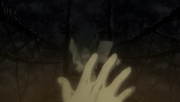  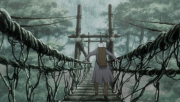 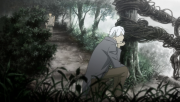     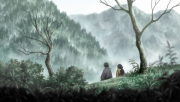 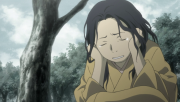  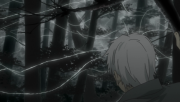  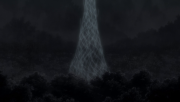 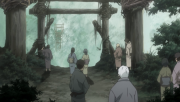 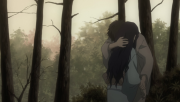  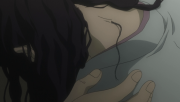 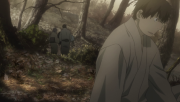   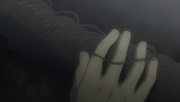 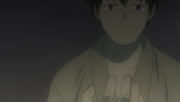  
EDIT: Just realized I didn't get 30. My bad. Will make sure to get the count right, next time. |
||||||
|
||||||
Tony K.
 Subscriber SubscriberModerator Posts: 11446 Location: Frisco, TX |
|
|||||
|
I've decided that a once-a-week entry format will be good and would prefer to post this on Fridays so that people can kinda' mull on the content over the weekend or possibly go back and forth to/from the thread if they've got nothing better to do with their time.
I see that people might still be hesitant to actually join the discussion, but, regardless, the thread itself is still getting a pretty decent amount of views. I believe I've gotten well over 200 views since my last post, and at least half of those were after the thread sunk down to page 2 of the Anime forum. Meaning people are interested in something. Whether it's my formerly overly-in-depth analyses of themes and symbolism, the detailed plot summaries, or the pretty pictures/screencaps that may or may not end up being used by other people for whatever purposes (wallpapers, plagiarized blogging, etc.), I guess I'm doing something right to attract so much attention. Anyway, this entry is a little late, as I ended up falling asleep quite early yesterday while under the drowsy side effects of Benadryl. I haven't had allergies this bad in years, and usually am not affected by anything other than large amounts of dust or fibers in the air like when I worked in retail. But now that I can breathe freely and don't have any annoying nasal drippage, I present you with: Episode 14: Inside the Cage (clicking this will take you back to the Index) ---------------------------------- Plot Summary Ginko stumbles upon a peculiar bamboo forest where a man claims to have been stuck there for 3 years. Upon eventually finding his way out of said forest, Ginko learns from the nearby village that an apparent and mysterious white bamboo tree lies somewhere in the middle of all the controversy. After finding the man once again, Ginko discovers that the white bamboo tree is a mushi called Magaridake, a mushi that takes the form of a singular bamboo tree and whose roots control the thoughts and actions of all its offspring throughout the forest as if they were limbs or extensions of itself. The man's wife, however, is a hybrid offspring of the Magaridake and a human woman, and his daughter, a result of their own procreation. And after further investigation, Ginko discovers that the water emanating from the mushi for all its children's sustenance has a unique power that restricts any one or thing from leaving the forest. Learning this truth, the wife feels torn that her husband was never able to leave the forest and go back to his friends and family in the village because of the mushi. She cuts the tree down, and the man is finally able to leave. But in his return to the village, so much fear and resentment had built up, that he and his daughter were no longer welcome. The man returns to the forest to live with his wife, until enough time passes without the mushi's presence (and water) that the wife and daughter eventually die. But upon burying their corpses and through a little passage of time, a new Magaridake sprouts in the forest, and two new children are born atop the graves of his family. ---------------------------------- Comments I almost thought this one would end up being as tragic as the last episode. I mean, the wife basically killed her parent for the sake of the husband to go back to village. But even then, everyone in the village shunned him because of their fear for the unknown, as is a normal reaction for any kind of mob mentality that doesn't understand something. Fortunately, with the nature of this particular mushi being very plant-like, I guess the life cycle of birth, death, and rebirth was a convenient characteristic to possess. A new Magaridake had sprouted, and the remnants of his wife and child became new offspring. And as typical of this franchise's universe, who's to say that these new vessels couldn't also have retained some former spiritual inklings of his family's souls? Plus, on the bright side they now had another "parent mushi" to provide the proper sustenance, so all wasn't lost after all. I think the prevalent themes for this episode were about "appreciating the present," "learning to let go of sentiment," and a little bit of "hope." The appreciation of the present is pretty obvious in the husband. Despite being stuck in the forest for years and not being able to see anyone from the village, he still had his wife and daughter. I mean, it could've been infinitely worse if the guy was stuck in the forest all by himself without nary a soul to talk to. But instead, he had what he presumably loved the most in life. And sometimes, that's just enough to happily get by. The idea of sentiment was a double-edge sword. On the one hand, sentimentality can add value to something, which, coincidentally, led to the aforementioned "appreciation of the present." But on the other hand, it can sometimes weigh you down, because for some personal reason you just won't allow yourself to move on. In this case, the sentiment for the husband caused his wife to cut down the Magaridake and essentially seal the fate of herself and their daughter. It was a bit of a weird cycle because the husband couldn't let the village go and the wife couldn't let the husband go, but it seemed to work out in the end. And that brings us to ever-present idea of hope. Given the nature of the series and its wholly mystical and unexplainable happenings (as such is life), there's always the chance that something good can occur, simply because the laws of physics and creation are so magical in this world. And what could've ended as another tragedy was, instead, a much more uplifting conclusion that gave hope for something better. People who keep asking/desiring/speculating/wanting more anime continuations and/or sequels could do well to learn from the themes in this episode ---------------------------------- More wonderful 1080p screencaps. I originally ended up with 51, but narrowed it down to a mere 30: 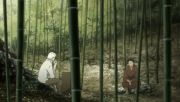 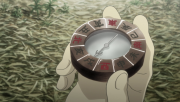   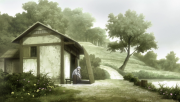 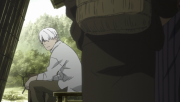 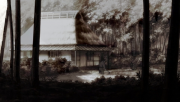  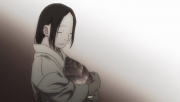 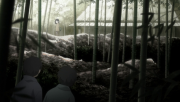 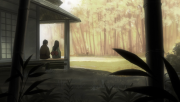 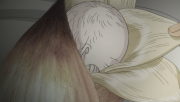 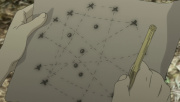  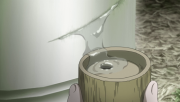  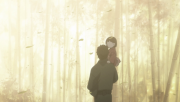 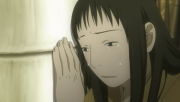 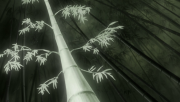 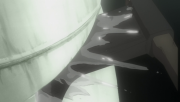 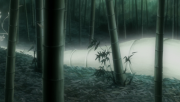 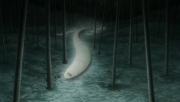 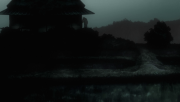 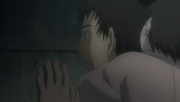 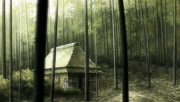 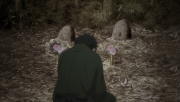 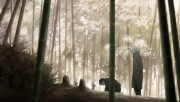  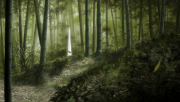 
---------------------------------- Thanks for reading. |
||||||
|
||||||
|
darkhappy1
Posts: 495 Location: PA |
|
|||||
|
Episodes 13 and 14 are my favorite episodes of Mushishi, and the fact that they are sequentially paired together emphasizes how complementary they are to each other, at least thematically. (Granted, it's been quite some time since I last watched these episodes, so there may be some inaccuracy and vagueness whenever I attempt recalling details not mentioned in the summaries. I really shouldn't be procrastinating on my work that I've already procrastinated on for a week now, but oh well.)
Hesitation plays a huge part in both episodes. The consequences of hesitation is much more immediate and metaphorically visible in Episode 13, as one step backwards on either the actual wooden or mushi bridges means plunging towards a "delayed" death, as the body is animate only to return to the village and then inanimate with only the most essential life functions preserved for a limited amount of time. The immediacy of these consequences is appropriate to the objectives, both of which required escape. The first objective that was shared by Hana and Zen, which was to eschew the arranged marriage and live on a relationship solely based on love, required the escape to be prior to the actual marriage taking place. Once the marriage happens, future elopement with Zen would lead to more recognizable, dire consequences: abandonment of her husband (with whom she may have found bearable) and possibly children, spiritual uncleanliness, rescinded benefits her village would have already received once the marriage happened, and as a result the relationship between the villages worsens dramatically. To much would have been established. Therefore, hesitancy was not an option, but she hesitated. She chose the village over Zen, both the character and peace of mind. The second objective, which is only Zen's (Ginko doesn't count in my analysis), is to escape from the village. Now, this is more based on hypothetical and metaphorical, but if Zen was not to escape using the mushi bridge, then he would never escape. At this point in the episode, he has nothing tangible left to hold him back, for all he had was Hana, and even then only her shell. Even when the wooden bridge is repaired, he would still hesitate, and after more thought, be physically and mentally held back by his deep love for her. If I remember correctly, Zen did eventually reach another village after falling, albeit possessed by the Nisekagura of course. However, this could still represent how, even if he did escape to another village, he would still feel empty because he is unable to mentally move on from Hana. Perhaps the fact that Hana couldn't cross the wooden bridge and Zen couldn't cross the mushi bridge is significant in what sort of trial the two individually went through. For Hana, the consequence is very tangible to not just her but to the entire village. For Zen, it is a spiritual trial. Ironically, Zen is unable to achieve inner peace even when Hana (which means Flower), the person to whom he directed all of his earthly desires, has died. Hesitation led both Hana and Zen back to where they started, either situational or metaphorically psychological, but once they've hesitated and fallen, they've proven that they would be unable to commit to their escapes and are thus resigned to their fates. The fall is a realization of loss, and the eventual return to land is evocative of resignation. Once they return, they are left regretful, empty, and longing for something they will never be able to reach, visible through their lifeless condition and the constant stare towards the sun. On a figurative level, they have already died. Only when the Nisekagura congregate again are they freed from this condition, but that means that they have completely died. This would be a completely bitter interpretation of Episode 13, but the slight sweetness that could be gleaned from this interpretation of the episode also relies on the congregation of the Nisekagura to form a bridge. If one interprets the entirety of the episode from a Buddhist perspective (which I shall do with the very shallow knowledge of Buddhism I have, apologies in advance), then this is an episode in which the inability to be free of desire even when the desire has become practically unattainable prevents the characters from reaching enlightenment. The Nisekagura are the souls that continue to crave unattainable earthly desires, bound to a state of suffering until death. Then, the Nisekagura move out of their physical bodies and join to form a bridge for the purpose of leaving the mountain, the earth, and starting another cycle of reincarnation. (It isn't as if the Nisekagura are ever going to disappear, after all.) (... Wow, I've typed a bunch of words for hours (soooo slow at writing), and I haven't even covered Episode 14 and how they're related yet. I'll edit this post with more of my thoughts when I have a bit more time.) |
||||||
|
||||||
Tony K.
 Subscriber SubscriberModerator Posts: 11446 Location: Frisco, TX |
|
|||||
|
Sweet. After all this time, there are still like-minded, long-winded thinkers like me roaming the Internet. It's great to see another "Mushishi-maniac" (I made that up just now, 'cause I couldn't think of anything else) that likes to interpret the possible deeper meanings within each of the stories.
You bring up an excellent point of the correlation between the bridges, morality, spiritualism, and allegory of how it all connects (that post is a good stopping point, by the way; please put your comments for episode 14 in another post; don't wanna make too big a wall of text to scare everyone off like I did before Getting to your proposed point of Buddhism, though, that's a very good approximation. From my general understanding of what my mother practices, the basic philosophy of Buddhism is to lead less so a material life, and more so a spiritual one. In this case, the elopement symbolizes a kind of physicality or material desire for Zen and Hana to run away and live together. But in doing so, the two of them would be turning their backs on their village, friends, and family. Eventually, their consciences may have become burdened with guilt, which, then, would possibly initiate a cycle of unhappiness that could've led to all sorts of scenarios and affecting their psyches in any number of ways later on. But because Hana hesitated, which, coincidentally, also caused Zen to hesitate, as you said, their fates were kinda' sealed from the very beginning, and it wasn't a happy ending. Perhaps their re-animation through the Nisekagura could be interpreted as a kind of purgatory, not as a representation of any particular religious concept, per se, but maybe as a "moral to the story" considering all the astute observations you made. |
||||||
|
||||||
Tony K.
 Subscriber SubscriberModerator Posts: 11446 Location: Frisco, TX |
|
|||||
|
Almost didn't do this today, as I didn't get much sleep the night before. But then I actually started watching this and it woke me right up!
It's kinda' amazing how much of a resonance I have with this show. I suppose its episodic-ness and particular style of storytelling make my mind feel at "peace," which, in turn, gets me more focused and alert from its content. Then again, I've always advocated that the "mystique" of the show *is* its main draw, after all, and is very unique *because* of said themes and elements. So, here's this week's review. Oh, and I'll probably be updating/editing a few posts over the weekend with pictures/scans of the DVD cover arts and booklets that I keep forgetting to do. And after looking at the old format of my earlier reviews, I think *will* re-do them, after all; mostly to re-format the plot summaries and screen-caps, but I might add some additional comments as well (or at least do some editing to make it less clunky). Episode 15: The Exaggerated Spring (clicking this will take you back to the Index) ---------------------------------- Plot Summary It's winter time; and Ginko comes across a little cottage where he encounters a boy named Miharu who can see mushi. However, there's a strange habit that the boy goes through every year: one day, he'll get up, wander out to a secret place in the snow, then return days later only to fall sleep throughout the entire winter season and awaken again at the beginning of spring. Knowing this, Ginko decides to say for a bit and teach Miharu about all the mushi in the area, only to discover that a particular mushi by the name of Usobuki is the cause of his Harumagai ("spring exaggeration," as the title implies) hibernation. But one day, Miharu goes out to find his secret place in the snow, only to fall asleep out in the open. Ginko brings him back, assuming that he'll wake up at spring time, just like usual, but says he can't stay that long since he attracts mushi. So Ginko leaves, and comes back the next winter, only to discover that Miharu had still been asleep the entire time. And in order to find a solution, Ginko decides to find Miharu's secret place. When he reaches it, however, he realizes that a particular butterfly he saw was, in fact, an evolved version of the Usobuki. Unfortunately, the initial stage of the mushi puts him into the deep hibernation as well. But he manged to get one of the butterflies, which was later released by Miharu's sister, Suzu, allowing the two of them to awaken at spring time. ---------------------------------- Comments I thought this episode felt like further exposition to the world of mushi more than anything else. Miharu was one of those people with the rare ability to actually see mushi. And, in a way, his amazement with them is what ultimately led to both, he and Ginko, falling into that deep winter sleep. And this goes back to highlighting one of the inherent themes of the series, which is "the natural order of things." In the world of the series, mushi simply exist as they are. Ginko talks about it in detail at one scene and mentions that they're mostly harmless unless you disturb them. And I think this is a testament to an excellent philosophy that for all the things that happen or exist in nature, there's usually nothing we can do about it. They are what they as a result of nature, and we just have to go with it. Not to say we can't try and study these things to better explain or prepare for them. But I think Miharu's inquisitiveness got the best of him, as referenced towards the end of the episode when Ginko commends him for starting to know the difference, which, again, feels like exposition, and a very good lesson to learn that "not everything is safe; and some things can be dangerous, if you're not careful." One other theme I did pick up on, though, was the desire of "longing." At various points when Ginko started to spend extended time with the siblings, I think there was a soft spot exposed between both parties in that they wanted each others company. Ginko seemed like he really wanted to take on Miharu as a pupil and teach him all about mushi, since meeting kids like that was probably a not-so-frequent occurrence to begin with. And then you had the siblings wanting Ginko to stay, since they obviously only had each other and no parents while living out in the middle of nowhere by themselves. And if you think about it, it's probably safe to say that after so much wandering, Ginko probably could've used a break as well, if not for the fact that he's a mushi magnet. But alas, it seems he's destined to just keep traveling all over the place and, at best, staying somewhere for no more than a few days. Kinda' sad that he'll always be alone like that... ---------------------------------- Screen-caps 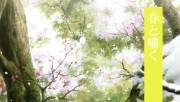  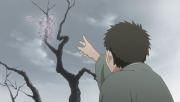 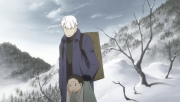   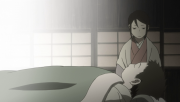    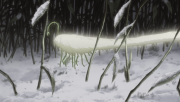 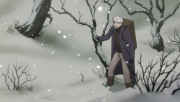 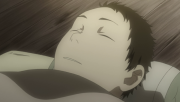  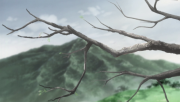 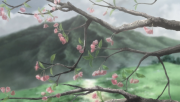 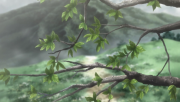 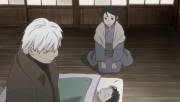    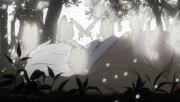  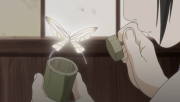   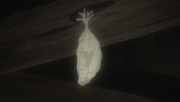 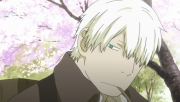 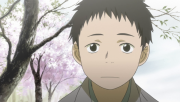 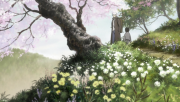
---------------------------------- I feel like I probably could've analyzed this episode a little more. But all this proofreading is starting to strain my eyes, and I *am* pretty sleepy -_-. Apologies if this review isn't quite as in-depth as my others. But definitely feel free to chime in if you picked up on anything else. Same time next week (hopefully.. and not so late into the evening). |
||||||
|
||||||
|
All times are GMT - 5 Hours |
||
|
|
Powered by phpBB © 2001, 2005 phpBB Group
